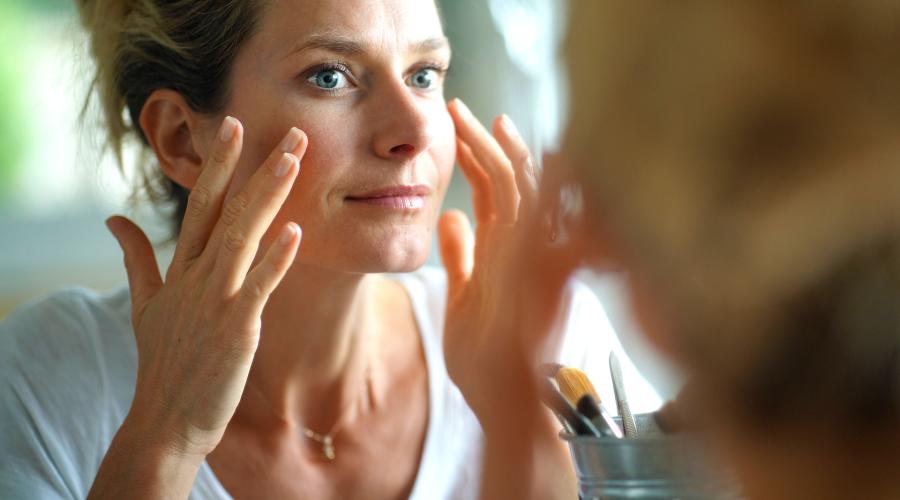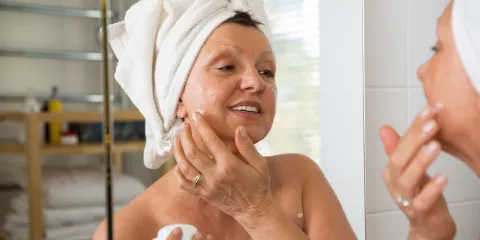
Wrinkles, age spots, and dryness are to be expected, but did you know your skin becomes more fragile with age? As we grow older, our skin becomes thinner, less smooth, and even takes longer to heal cuts, scratches, and bumps.1 Although you can’t turn back the clock, there are a few ways you can protect your skin and make it look and feel better.
Read More: 5 Time-Tested Rules For Aging Well
Moisturize
Aging skin produces fewer natural oils, which can cause uncomfortable dryness.2 To hydrate your skin, be sure to regularly apply moisturizer throughout the day. Applying moisturizer after a shower or bath is especially important for rehydrating the skin, and dermatologists recommend applying lotion within three minutes of getting out of the shower.3 If you find your skin is still dry and itchy, try applying lotion a few times a day or switching to a thicker moisturizer. Thinner creams tend to be water-based, which aren’t as effective at helping dry skin retain moisture.4
Pay Attention To Water Temperature & Soaps
Daily showers can dry out the skin even faster. Try to space out your showers throughout the week, keeping hygiene in mind. When you do shower, use warm water instead of hot water. Hot temperatures can remove the natural oils from your skin, increasing dryness.5 In addition, check your shampoos and soaps to make sure they’re not too harsh on your skin. If you’re still feeling dry after moisturizing, you may need to switch to milder options for cleansing.
Protect Yourself From The Sun
One of the best ways to care for your skin is to protect it from the sun, even on cloudy days. Use broad-spectrum sunscreen with SPF of 15 or more before going outdoors, and make sure to reapply every two hours. Opt for shady spots when the sun is strongest (between 10 a.m. and 4 p.m. ) and wear protective clothing, hats, and sunglasses to give your skin extra protection.6
Use A Humidifier
A humidifier can help relieve dry skin by adding extra moisture into the air. Ideal humidity levels in the home should be between 30%-50%.7 To measure your home’s humidity, try using a hydrometer, which you can buy online or at a hardware/home improvement store. If you choose to use a humidifier, be sure to regularly and thoroughly clean the machine to avoid a buildup of bacteria and mold.
See A Dermatologist
Around 50 years of age, the risk of developing skin cancer and pre-cancerous growths increases.8 Early identification (and if necessary, removal) of suspicious growths is key to effective diagnosis and skin cancer treatment, so be sure to see a dermatologist regularly.5
Stop Smoking
Smoking can damage your skin in many ways. In addition to contributing to wrinkles and accelerated aging, smoking can reduce the elasticity of your skin. Smoking can also narrow the blood vessels in the outer layer of skin, reducing the blood flow and making it more difficult for your skin to receive nutrients and oxygen.9
If you’re experiencing some of the negative effects of aging skin, these tips and tricks can help you look and feel your best. If you have additional questions about your skin care routine or have specific concerns about your skin, be sure to consult your doctor.
Articles You Might Also Like
References
1 https://www.nia.nih.gov/health/skin-care-and-aging
2 https://www.webmd.com/beauty/features/age-dry-skin#1
3 https://thedermatologyoffice.com/important-moisturize-aging-skin/
4 https://www.webmd.com/beauty/features/moisturizers#1
5 https://www.aad.org/public/everyday-care/skin-care-basics/care/skin-care-in-your-60s-and-70s
6 https://www.mayoclinic.org/healthy-lifestyle/adult-health/in-depth/skin-care/art-20048237
7 https://www.mayoclinic.org/diseases-conditions/common-cold/in-depth/humidifiers/art-20048021
8 https://www.cancer.net/cancer-types/skin-cancer-non-melanoma/risk-factors-and-prevention
9 https://www.mayoclinic.org/healthy-lifestyle/quit-smoking/expert-answers/smoking/faq-20058153












